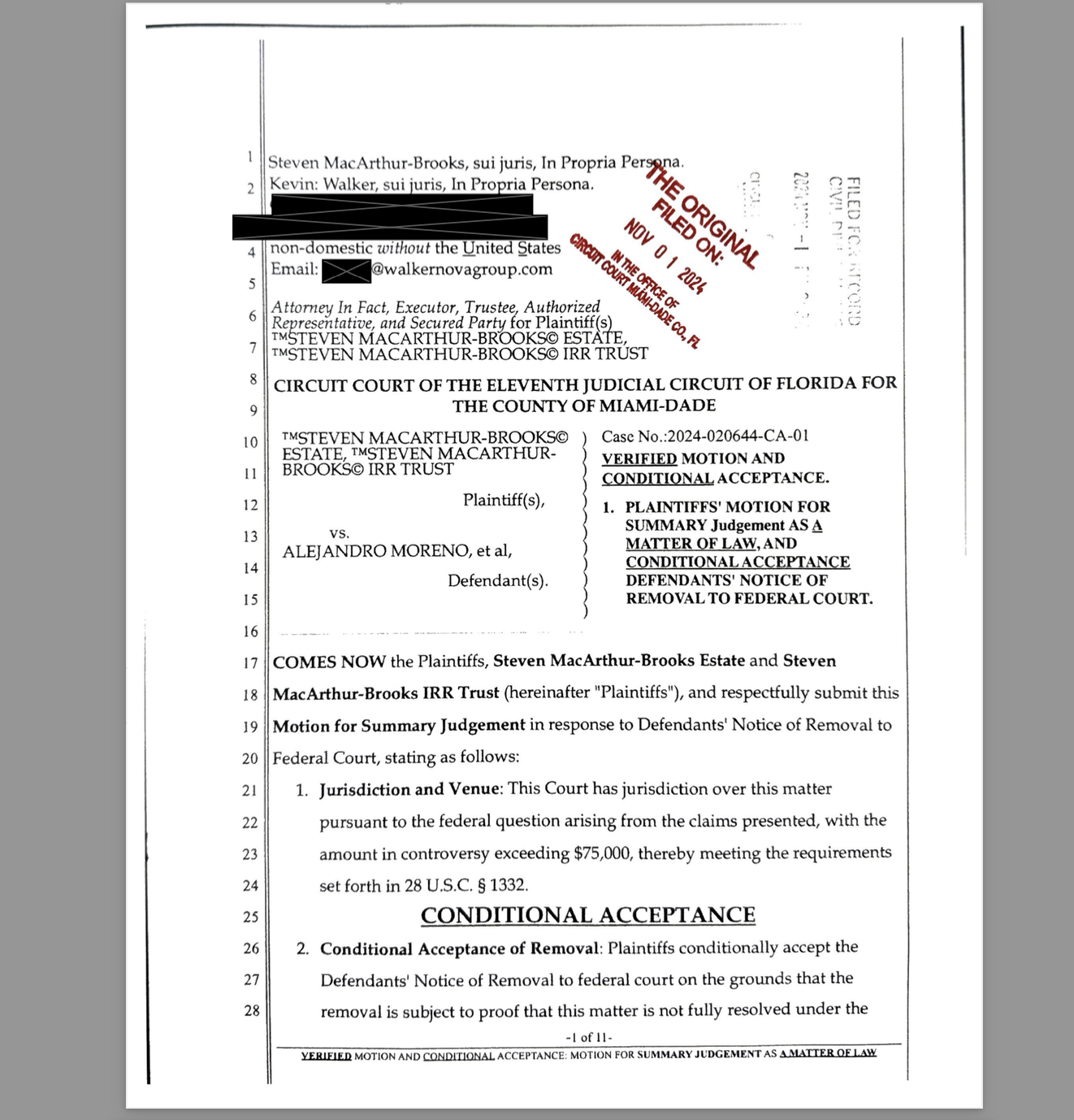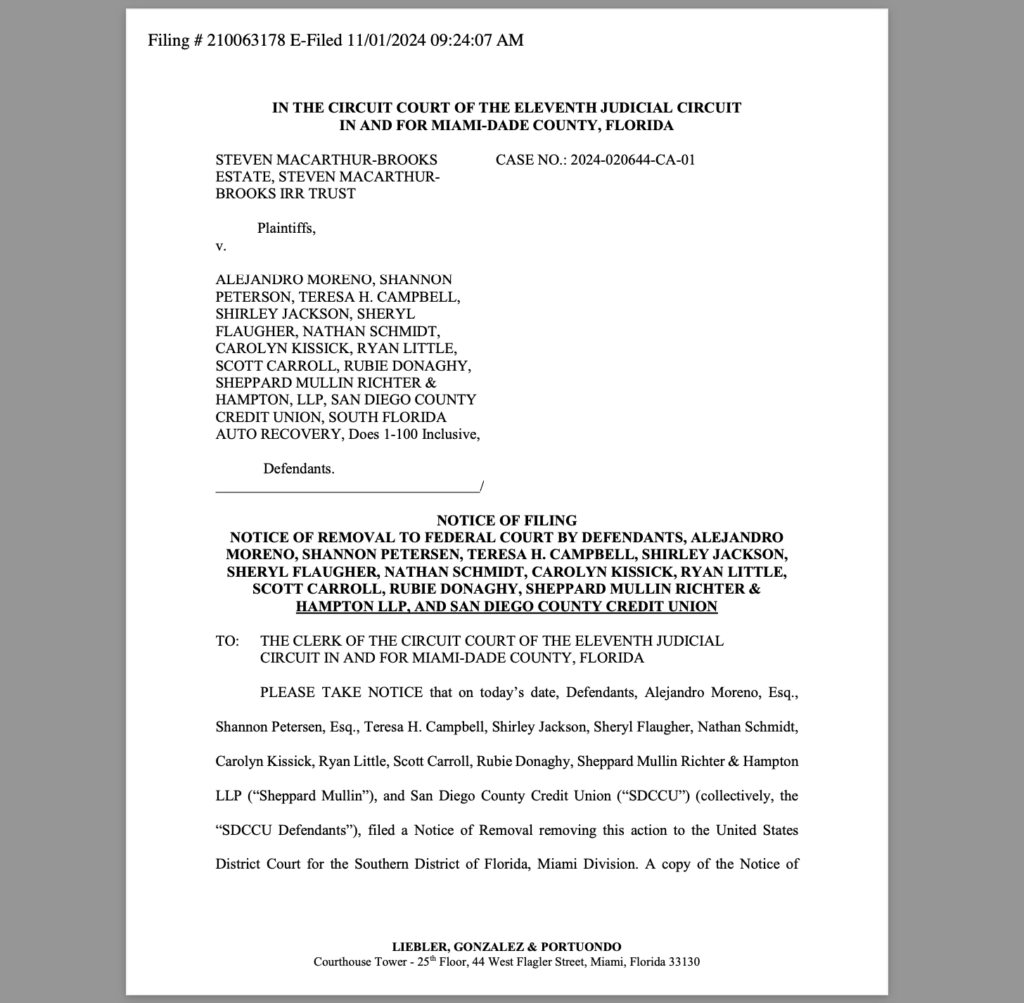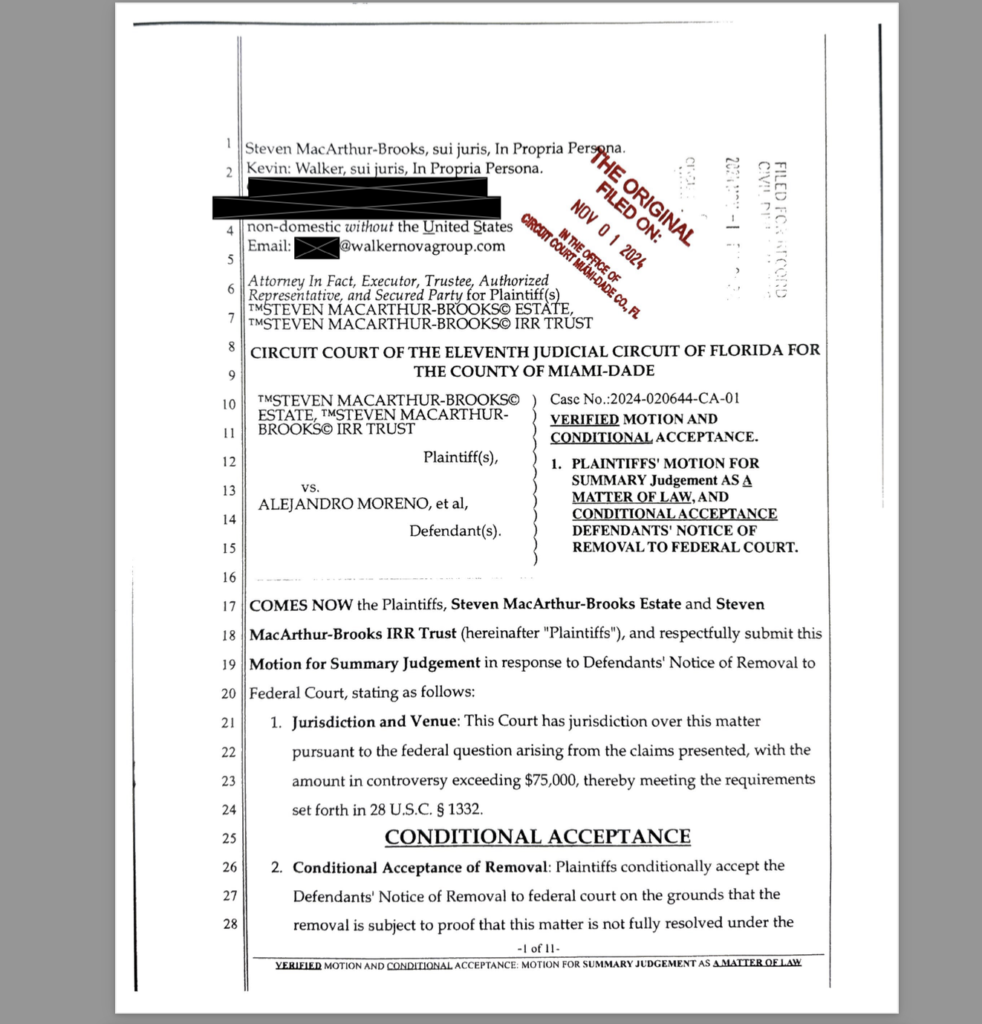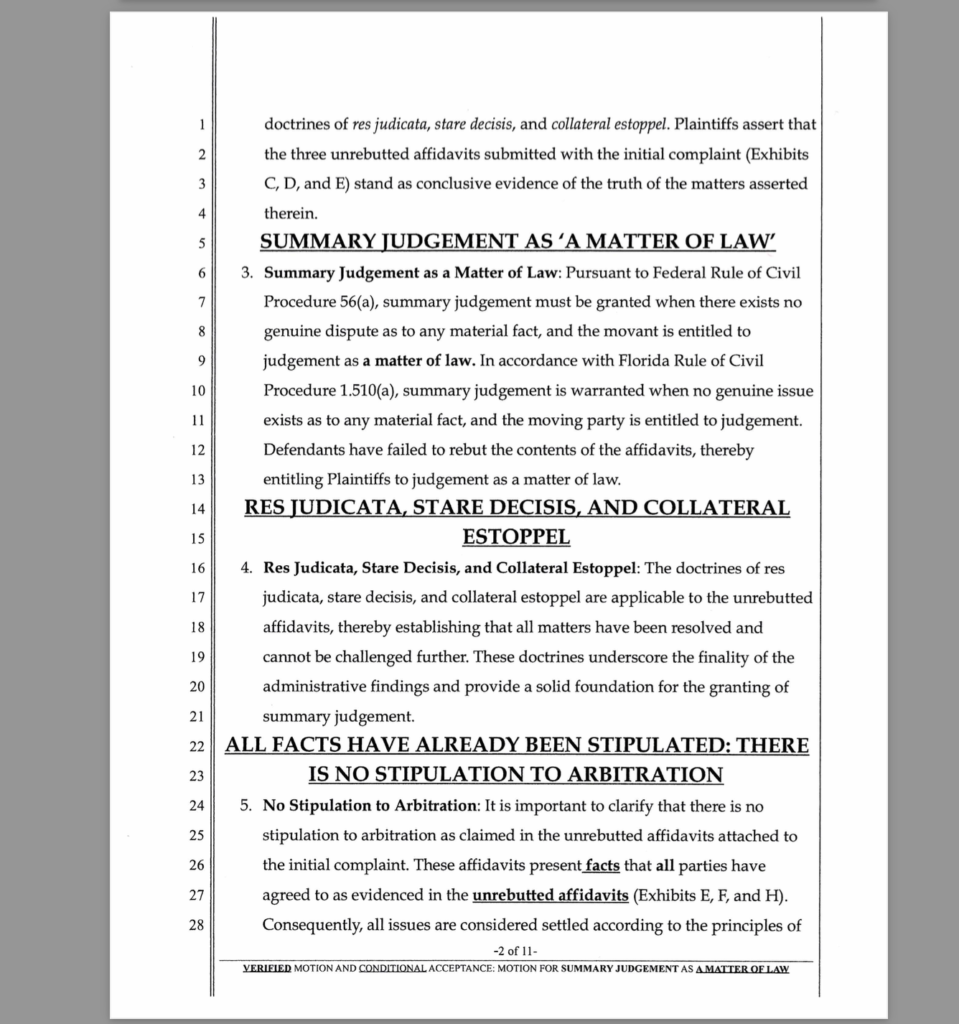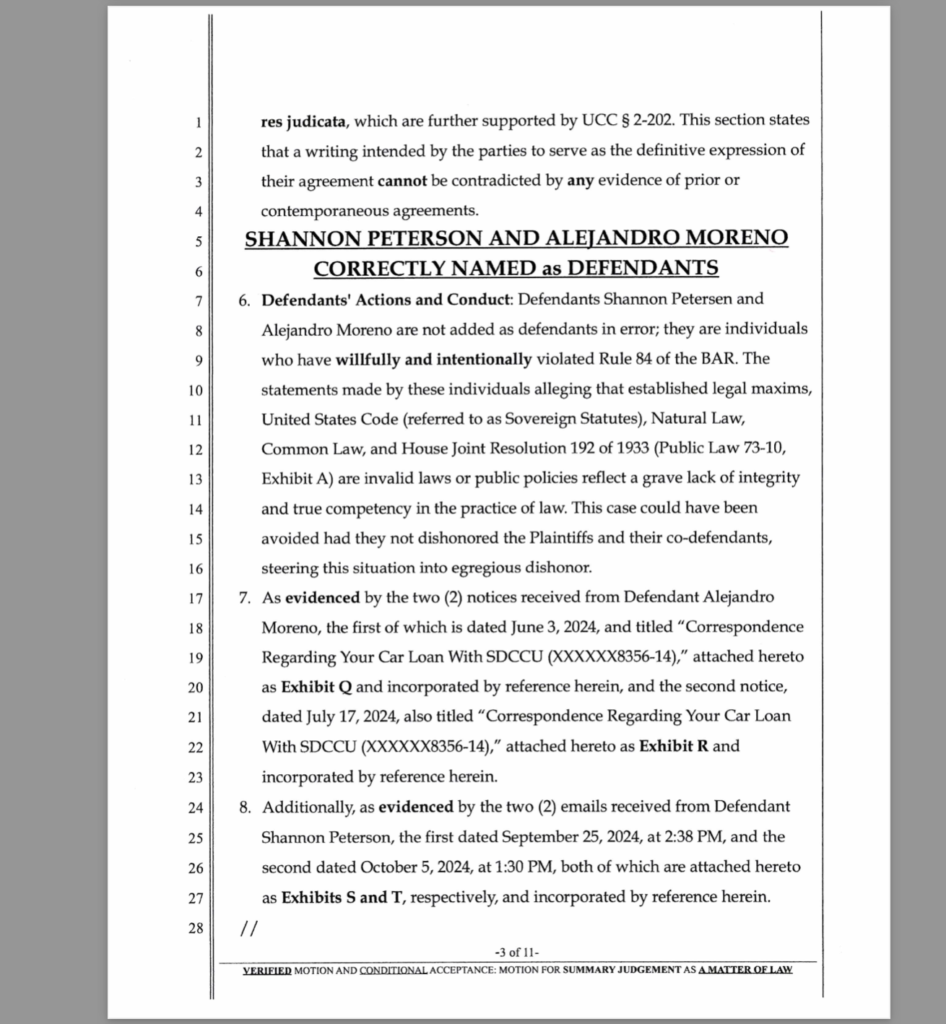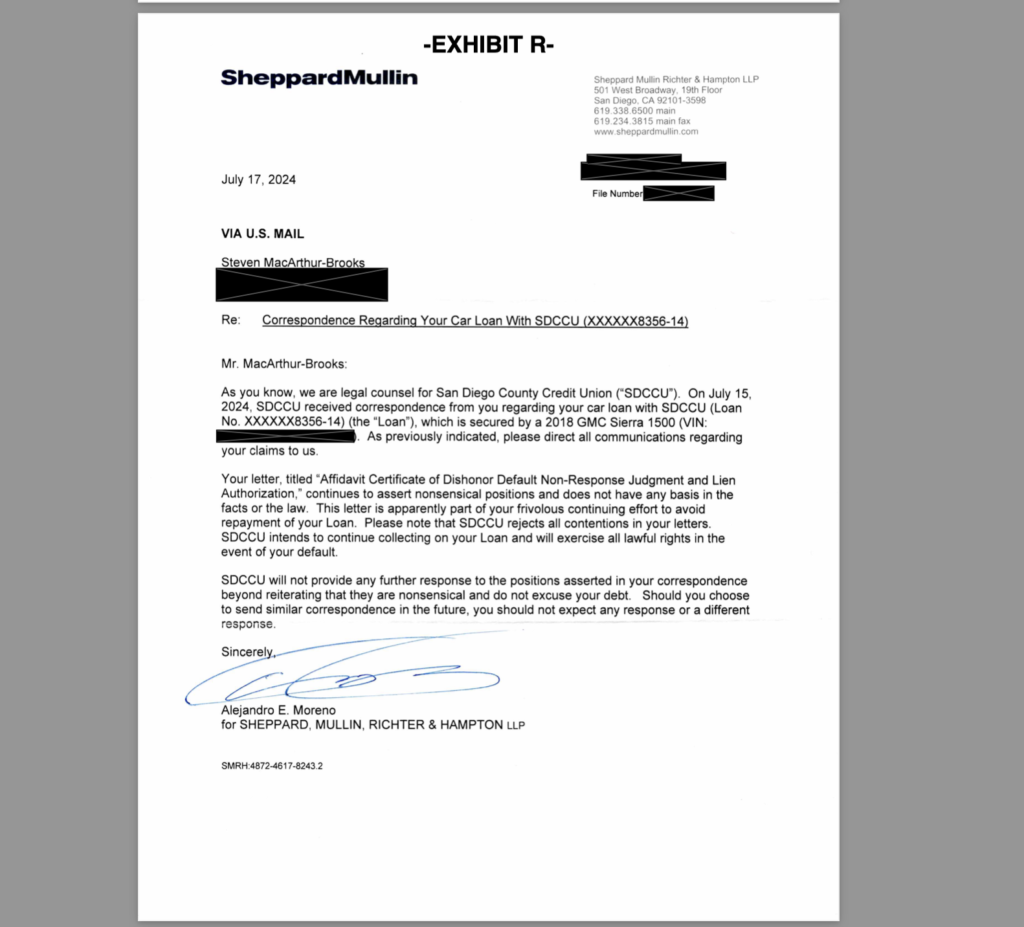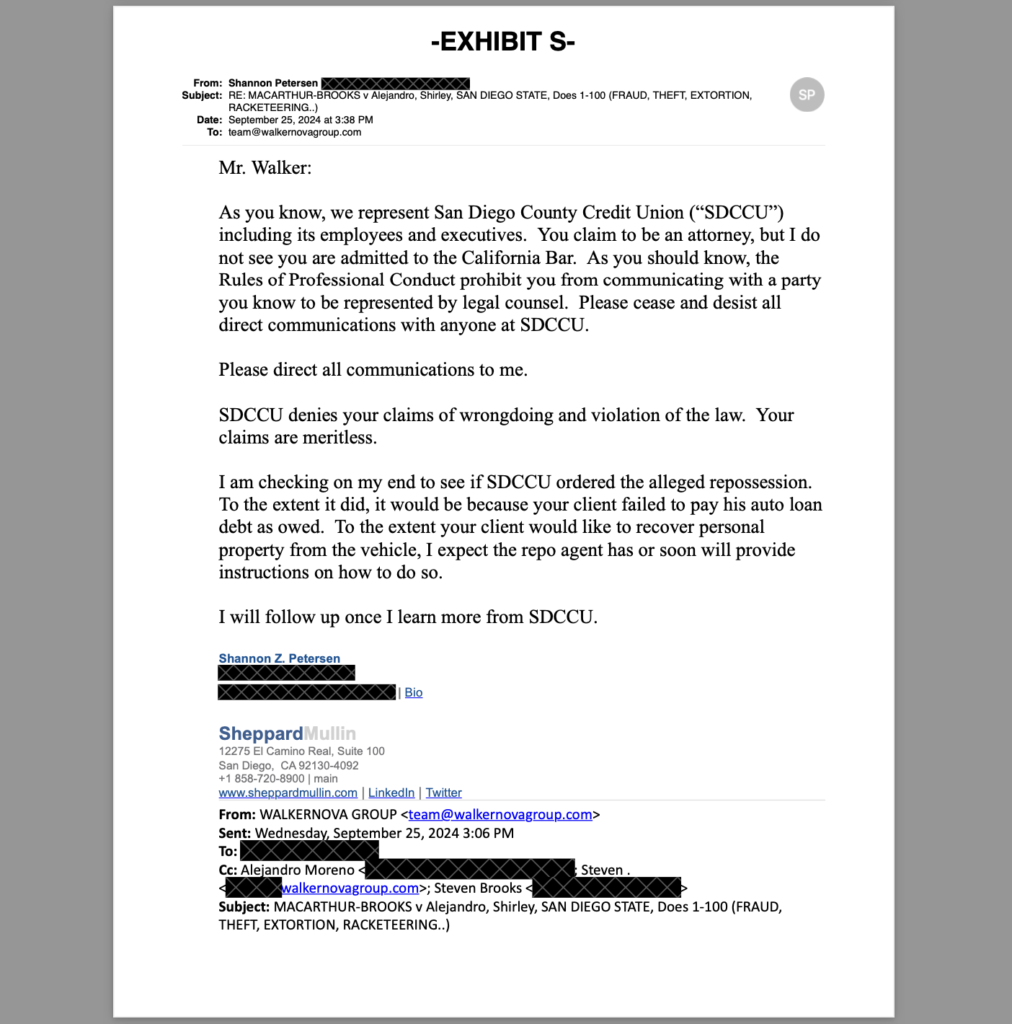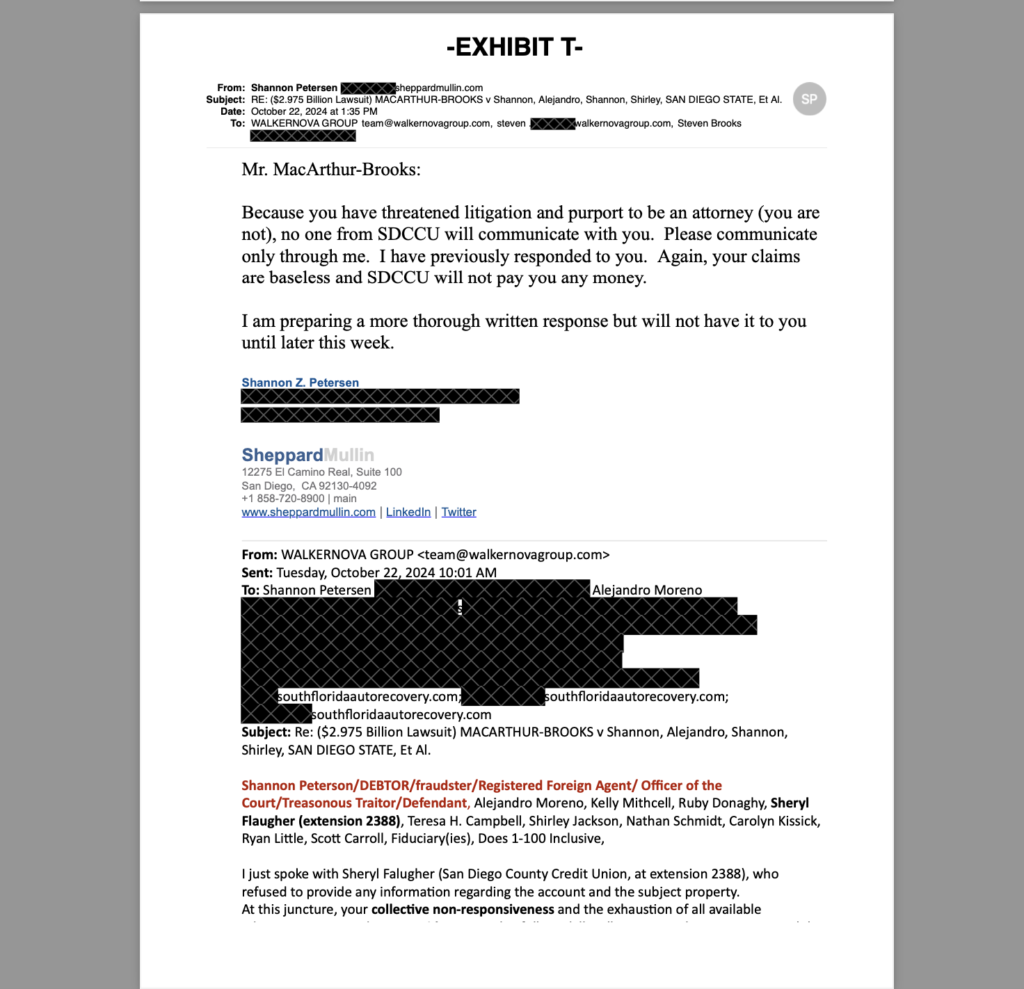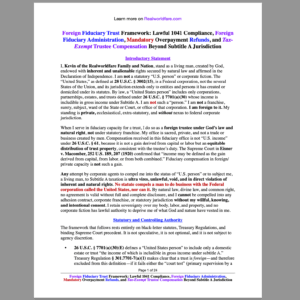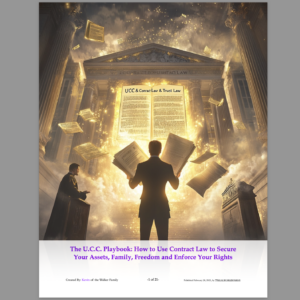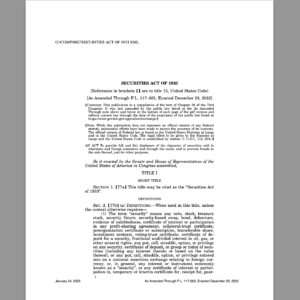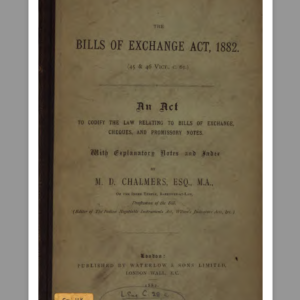In a significant legal matter, defendants San Diego County Credit Union, Sheppard Mullin, et al., submitted a Notice of Removal to federal court, embedding language that seemingly attempted to introduce false stipulations to the case. Attorney in Fact Kevin L. Walker and Steven MacArthur-Brooks, on behalf of plaintiffs STEVEN MACARTHUR-BROOKS Estate and STEVEN MACARTHUR-BROOKS IRR Trust, responded the same by filing a Verified Motion for Summary Judgment and Conditional Acceptance, which confirms that this case requires immediate summary judgment due to the firm, unrebutted verified commercial affidavits and binding principles of offer, acceptance, and contract law, as as a matter of law.
Conditional Acceptance, Federal Jurisdiction, Unrebutted Affidavits
The Plaintiffs’ Verified Motion stands on a clear conditional acceptance of the Defendants’ Notice of Removal. This acceptance includes stipulations that demand Defendants to substantiate that the issues at hand are not already settled under principles such as res judicata, stare decisis, and collateral estoppel. With three unrebutted affidavits from the initial complaint (Exhibits C, D, and E), the Plaintiffs affirm that these affidavits are factual and, as such, legally binding. The lack of rebuttal from the Defendants unequivocally leaves these affidavits uncontested as true.
AN UNREBUTTED AFFIDAVIT STANDS AS TRUTH IN COMMERCE. (12 Pet. 1:25; Heb. 6:13-15) — “He who does not deny, admits.” Plaintiffs confirm that under contract law, a conditional acceptance forms a binding agreement, and by remaining silent, Defendants effectively consent to the factual basis presented in these affidavits.
AN UNREBUTTED AFFIDAVIT BECOMES THE JUDGMENT IN COMMERCE. (Heb. 6:16-17) — “There is nothing left to resolve.” The Plaintiffs reaffirm that summary judgment is warranted “as a matter of law” according to Federal Rule of Civil Procedure 56(a) and Florida Rule of Civil Procedure 1.510(a), both of which call for summary judgment when no genuine dispute of material fact exists. The unrebutted affidavits leave no factual dispute, seemingly clearly entitling Plaintiffs to judgment as a matter of law. This is further codified in statutes, emphasizing that when uncontroverted evidence exists, the court must act accordingly to uphold the law.
HE WHO LEAVES THE BATTLEFIELD FIRST LOSES BY DEFAULT. (Book of Job; Mat. 10:22) — Legal maxim: “He who does not repel a wrong when he can occasions it.
IN COMMERCE TRUTH IS SOVEREIGN. (Exodus 20:16; Ps. 117:2; John 8:32; II Cor. 13:8 ) Truth is sovereign — and the Sovereign tells only the truth.
DOWNLOAD FILE
Affidavits as Binding Evidence
The Plaintiffs confirm that these affidavits, unrebutted and thus admitted by the Defendants, stand as conclusive, irrefutable truth in the matter. TRUTH IS EXPRESSED IN THE FORM OF AN AFFIDAVIT. (Lev. 5:4-5; Lev. 6:3-5; Lev. 19:11-13; Num. 30:2; Mat. 5:33; James 5:12). Established cases such as Winsett v. Donaldson and Sieb’s Hatcheries, Inc. v. Lindley affirm that unrebutted affidavits serve as admissions of truth. Therefore, no further action or argument is required, as these affidavits have become legally uncontested evidence in this case. Furthermore, doctrines such as stare decisis and collateral estoppel prevent any re-litigation of these established facts.
No Stipulation to Arbitration, UCC § 2-202, and the parole evidence rule
It is also established that no stipulation to arbitration exists in this case. Defendants’ actions, including their attempt to introduce new stipulations, are legally irrelevant to the binding effect of the three (3) unrebutted affidavits. The Uniform Commercial Code (UCC) § 2-202 disallows the introduction of external agreements to contradict a final written agreement, which, in this case, is the conclusive statement of fact provided by the affidavits. Additionally, the parol evidence rule further reinforces that no extrinsic evidence can be used to alter or contradict the terms of the written affidavits, solidifying their status as binding and conclusive evidence in this matter.
Specific Defendants’ Misconduct
The Plaintiffs identify Shannon Petersen and Alejandro Moreno for specific violations of Rule 84 of the BAR, affirming that these individuals have disregarded foundational legal principles, including House Joint Resolution 192 (Public Law 73-10). IN COMMERCE, FOR ANY MATTER TO BE RESOLVED, IT MUST BE EXPRESSED. (Heb. 4:16; Phil. 4:6; Eph. 6:19-21) — Legal maxim: “To lie is to go against the mind.” The records show that Petersen and Moreno’s disregard of these principles has led to unwarranted delays in litigation, with Exhibits Q, R, S, and T substantiating the Defendants’ refusal to honor legal protocols.
(a) violate or attempt to violate the Rules of Professional Conduct, knowingly assist or induce another to do so, or do so through the acts of another;
(b) commit a criminal act that reflects adversely on the lawyer’s honesty, trustworthiness or fitness as a lawyer in other respects;
(c) engage in conduct involving dishonesty, fraud, deceit or misrepresentation;
(d) engage in conduct that is prejudicial to the administration of justice;
(e) state or imply an ability to influence improperly a government agency or official or to achieve results by means that violate the Rules of Professional Conduct or other law;
(f) knowingly assist a judge or judicial officer in conduct that is a violation of applicable rules of judicial conduct or other law; or
(g) engage in conduct that the lawyer knows or reasonably should know is harassment or discrimination on the basis of race, sex, religion, national origin, ethnicity, disability, age, sexual orientation, gender identity, marital status or socioeconomic status in conduct related to the practice of law. This paragraph does not limit the ability of a lawyer to accept, decline or withdraw from a representation in accordance with Rule 1.16. This paragraph does not preclude legitimate advice or advocacy consistent with these Rules.
DOWNLOAD FILE
Exhaustion of Administrative Remedies and Defendants seemingly in Dishonor
Additional exhibits (Q through T), including written correspondences with the Defendants, clearly demonstrate the Plaintiffs’ exhaustive efforts to resolve the matter administratively. This series of correspondences reveals the Defendants’ continuous dishonor and failure to address Plaintiffs’ claims, rendering judicial intervention necessary. HE WHO LEAVES THE BATTLEFIELD FIRST LOSES BY DEFAULT. (Book of Job; Mat. 10:22) — Legal maxim: “He who does not repel a wrong when he can occasions it.”
Law Principles Supporting Summary Judgment
The Plaintiffs invoke enduring legal maxims and principles that further underscore their position. IN COMMERCE, TRUTH IS SOVEREIGN. (Exodus 20:16; Ps. 117:2; John 8:32; II Cor. 13:8) — “Truth is sovereign, and the Sovereign tells only the truth.” As no rebuttal has been provided, according to law and principles, Defendants’ silence constitutes silent acquiescence, tacit agreement, and tacit procuration, affirming that the unrebutted affidavits represent the truth, as supported by Law. Additionally, all individuals, public officials included, are subject to the law when infringing on constitutionally protected rights, as confirmed by legal precedent.
ALL ARE EQUAL UNDER THE LAW. (God’s Law – Moral and Natural Law) Exodus 21:23-25; Lev. 24:17-21; Deut. 1:17, 19:21; Mat. 22:36-40; Luke 10:17; Col. 3:25 — “No one is above the law.” Plaintiffs affirm that the principle of legal equality mandates that the verified commercial affidavits, being unrebutted, stand as the final contract agreement(s) by all parties.
Conclusion: The Court’s Clear Duty to Issue Summary Judgment
It is seemingly beyond evident that the court is bound to immediately issue summary judgment in favor of the Plaintiffs based on the unrebutted verified commercial affidavits and binding principles of contract law. Given Defendants’ failure to provide any substantive response, the requirement for the court to act sua sponte in favor of summary judgment appears both evident and necessary to maintain the integrity of legal principles and common law.
Plaintiffs affirm that the court must uphold these principles without delay, issuing a summary judgment based on the admitted truth of the affidavits, with no room for additional stipulations or compromise.
By proceeding in this manner, the court would act in accordance with the rule of law and the core values of justice, ensuring that all admitted facts and unrebutted affidavits are given due legal effect as final and uncontested truth in this case.
